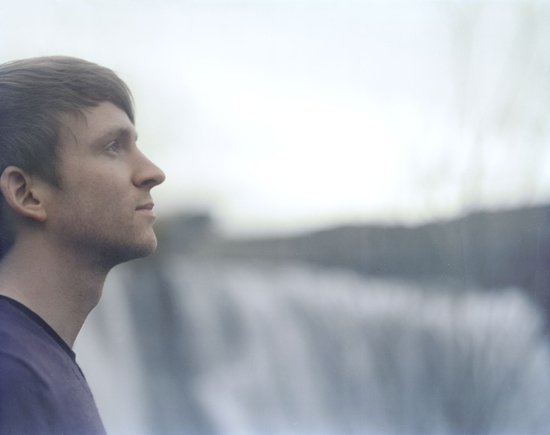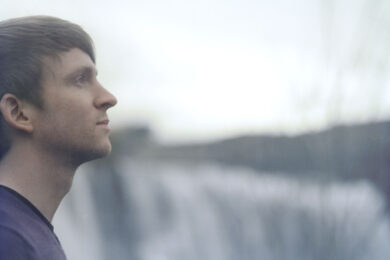It shouldn’t really come as a surprise that on the phone Ólafur Arnalds comes across as shy and mild-mannered, slightly bemused even at the attention that’s been placed on his fledgling career. But then the young Icelandic musician also gives the impression of a man so interlocked with his work – this interview was put back a couple of hours as he’d spent all night working on a film score – that to actually pull himself back and try to elaborate on it with nothing other than plain words is a still unfamiliar concept. This is a career that’s already taken in a stint drumming for hardcore group Fighting Shit, supports slots with fellow Icelandic group Sigur Ros and, most importantly, two breathtaking albums in 2007s knife-edge tense Eulogy For Evolution and this year’s warmly expansive "…And They Have Escaped The Weight Of Darkness" – indeed, here at The Quietus Wyndham Wallace captured the latter’s sheer emotional gravitas with a wonderfully impassioned piece.
Let’s not confuse timidity with incoherence though. For while Ólafur at times struggles to put into words what his pieces mean – a task that would prove challenging for the finest scribe – he speaks directly in matters such as the elitism rife in the world of classical music, the misconceptions of how others might view his homeland in light of recent economic and environmental events, and the excitement felt at taking his music live with a full orchestra for the first time at Manchester’s Bridgewater Hall on July 1st – with one of his idols, Jonny Greenwood, on the same bill.
Let’s get straight into talking about the new album ["…And They Have Escaped The Weight Of Darkness"] would it be fair to say that it seems more reflective and considered? Eulogy From Evolution seemed a lot more instantaneously passionate, there’s emotion here but it feels calmer.
ÓA: I think it’s more together; when I did the first album I didn’t really know what I was doing and it was more just a collection of songs that I’d been writing and was trying to put together. All those songs were the first that I wrote in this style of music. I think the first record will end up being the most self-reflective and most about my life because I didn’t have enough control over the writing to pre-decide what I wanted to do and do it at that point.
So what inspired this one?
ÓA: Many different things. It was a collection of songs written over a long time, but from the beginning I had very clear goals in mind with trying to make it more positive and calmer, a lot of it stemmed just from having more mature conversations and being a bit more grown up.
The message "…and there is light after the darkness" is simple, but I guess one you feel isn’t always remembered.
ÓA: I don’t know…erm…yeah! Basically.
You say you’ve had these songs for a while now, how do you feel about putting them out into the live environment?
ÓA: Well I’ve already played them a lot live; with this album, more than the first, I was able to test the songs and see how they would fare and then change them about a bit more – I had much more opportunity to work on them in that way. They’ve all been played live, but this’ll be the first time with an orchestra, which is really exciting actually.
How different have you found it preparing them for an orchestra? The organisation must take so much more time.
ÓA: Oh I’ve had to re-arrange everything. What was previously on drums is now on other percussion, and there’s woodwind and brass that’s not there on the album and I’ve had to include them. A lot of the songs have changed, in some cases I’ve made new endings and just tried to have fun with them. I’ve not even heard how it’s going to sound, we’ve not started rehearsing yet.
You’ve got Jonny Greenwood playing on the same bill as you in Manchester, is he someone whose been on an influence on you with his own solo work?
ÓA: Well mostly from Radiohead actually, I’ve not listened to much of his classical – I’m not really from a classical background – but he’s one of my idols and always has been.
From what period of Radiohead‘s career?
ÓA: Post Kid A, definitely, second period of Radiohead.
You used play drums for a hardcore group called Fighting Shit; how’ve you managed to come all the way from that to this? Has the classical side of your music always been there?
ÓA: Yeah, it’s not really much of a transition. It’s not that I stopped doing that and started doing this, it was just about expanding the horizon and doing more. You can’t just spend your life doing one thing, y’know?
Definitely, though do you still find time to play for them?
ÓA: Not really though not because I’ve lost interest, I’ve just not got much time.
Hardcore and punk are such an instant, direct expressions emotion, whereas what you’re composing now is a far more drawn out process of feelings; how’ve you found the contrast?
ÓA: Well it’s initially quite a similar thing. You still start writing a melody and a chord progression – that’s not very different. What I’m doing now though is a whole different story because what I do now before each song is spend three days in the studio arranging everything. But I don’t think you lose any emotion from the finished work.
The period when you wrote your first album was influenced by the death of your uncle, how hard a time of your life was that for you?
ÓA: It wasn’t like super hard, but it was something that changed my life, definitely. He was the first person really close to me who’d died, and gone before his time. It changes your perspective on everything. My grandad had died when I was young, but this was the first time I’d lost someone who I didn’t expect to lose; but it wasn’t that that specifically inspired the album. Months later his first grandson was born and was given his name, so it was that circle of life pattern which inspired the album. In the same way, it’s that concept that influences the latest album; life always goes on, there’s always darkness after light and then after darkness there’ll be light again – it’s a circle.
You’d definitely describe it as more positive?
ÓA: Yeah, this new one definitely.
For me there’s a definite feel of more warmth.
ÓA: Yeah, and that was the point I aiming for. With the first one I wanted to leave people with a sense of sadness at the end, whereas with this one I wanted to leave them feeling positive.
In the past you’ve pointed out the elitism of the classical world and how it’s closed to people who haven’t been learning it all their lives. Why do you think it is so hard and what does the split revolve around?
ÓA: It’s not all of it, but a lot is very elitist. Modern classical music is very complicated and people don’t understand it unless they’ve been studying it themselves. It’s locked itself inside of a small circle and it’s sad really because there’s a lot of good classical music out there; and it’s also sad because those in the circle are also prejudiced against other types of music. I studied classical composition and I have many examples of teachers trying to push me in a direction of music that no one would understand and yet I had to try and find it.
How have you learnt it then?
ÓA: I figured most of it out on my own, when I started out I didn’t have a classical background. I started at music school and did some theory but took a while before I decided to go and learn more. I joined the University of Classical Composition but dropped out after one year.
Why was that? Did you feel restricted by what you were learning?
ÓA: It wasn’t just that, but that was part of it. I didn’t really get to do the stuff that I wanted to do. But then I was touring a lot by then too and had to choose whether I wanted to carry on studying or continue with this project.
There’s the fear as well, especially with something so technical as composition, that if you get taught too much you’ll lose your creativity and uniqueness within that, so it’s as important to teach yourself as well as be taught; would you agree?
ÓA: Yeah, but good schools know that and they’ll encourage people to do their own thing… but not all do that.
Additionally, with regards to falling outside of classical convention, you seem more known to fans of popular music than those of classical?
ÓA: Yeah, but then a lot of it isn’t actually classical music, some of it is pretty classical but I don’t perceive a lot of it like that.
And that’s a kind of subversion of compositional music then I guess?
ÓA: Yeah, because I want to reach people who might not otherwise listen to this sort of stuff.
Do you think the outside world now expects music from Iceland to have this big grandiose feel like akin to yourself, Jonathan Johansson and Sigur Ros?
ÓA: Yeah, that is actually the case. I mean basically it’s just us three that you mentioned doing this, a lot of what’s about at the moment is electro-pop and stuff like that.
The flip side being that it’s actually a positive thing to associate with Iceland, would you say?
ÓA: Yeah, I don’t actually mind it. There’s a preconception that’s not always true certainly, but it’s fine and in a way it helps us, it’s created this Icelandic image that’s good for us and helps us promote our music. People are more likely to check out an act from Iceland because of it.
I think of you as different from, say, Sigur Ros within that as well. Their output seems really nature-based and environmental; yours stems from very human-ingrained emotions and life events
ÓA: Yeah it feels that way, I mean there are similarities, but we’re really very different.
Being Icelandic at the moment, who maybe deals with the outside world a little more than your countrymen, how do you see your homeland at the moment with the eyes of Europe on it owing recent environmental and economical events?
ÓA: I don’t see it any differently to be honest, it’s nothing new for us to have volcanoes and the financial crisis is the most overrated thing in history. Our unemployment rates went from something like 0% to 7% which is a big jump, but that’s still less unemployment than most other countries in Europe. Of course some people are in big trouble and that’s horrible, but it’s not nearly as bad as the outside world has pictured it. Iceland is still just Iceland for me.
Is most of your time still spent there?
ÓA: Yeah, apart from touring, most of my recording and composition goes on here.
Thank you for answering my question Ólafur, one final thing – it’s amazing to think of all you’ve done and you’re still just 23. Do you ever have time to just mess about like an average young man or not?
ÓA: The past two or three years definitely not; I mean, I’ve missed out on a lot, but what I’ve got as a result is definitely worth it.
Ólafur Arnalds plays the Bridgewater Hall, Manchester on July 1st. For more information, go here



